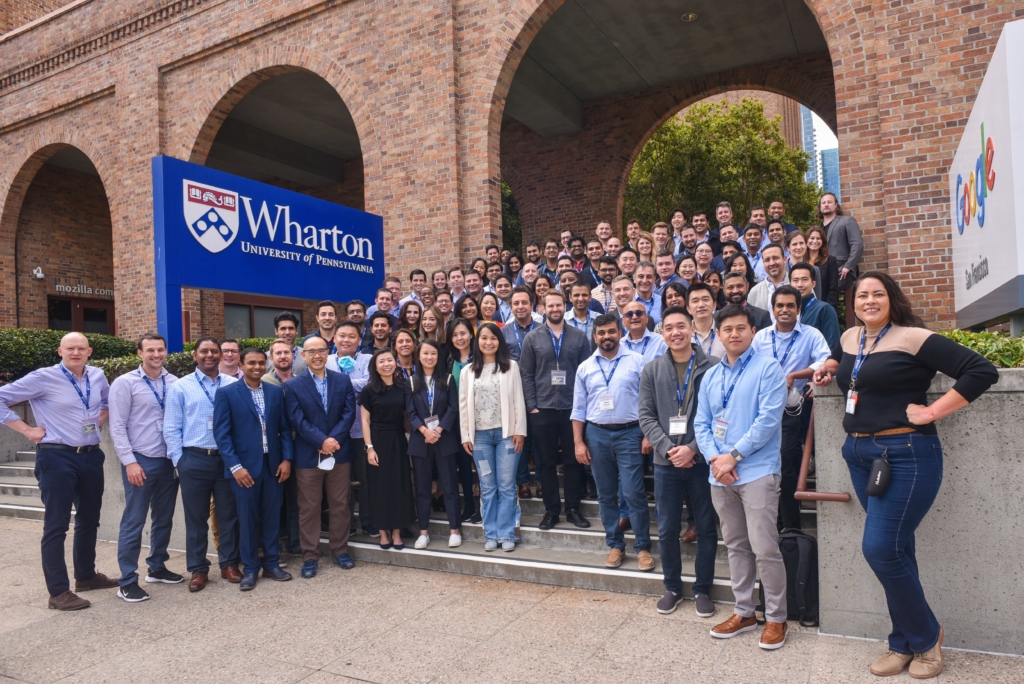
The Class of 2023 Wharton San Francisco cohort. Courtesy photo
Tell me more about your family.
I have two kids; My daughter is 6 years old, and she will go to first grade. She’s at summer camp now. My son just turned two years old, and my wife is also going through a pivot in her career. She had a home business, and with COVID, the demand just plummeted. Nursing fell into her strengths and, I would say her passion, and she wants to work in a hospital setting taking care of patients. She is now in nursing school.
Wow. That is a lot. How have you and your wife managed it all? Two young children, both of you in demanding school programs?
We get a lot of help from my wife’s parents. Actually my wife goes to a nursing school in Boston, so both the kids are with her. I travel there every two weeks, and I stay there for 10 days since my work is remote. So, when it’s the time for classes, I travel back to the Bay Area. If my work requires it, I’ll stay here for a few more days.

Tejinder Singh and his family on Disney vacation in May. Courtesy photo
How have I managed? I think it’s a lot of discipline. I have emphasized that I want to get the best out of my experience of the Wharton executive MBA. When professors give you information, they are channeling their experience to us, and it is for us to absorb as much as we can, and then go and apply that to our careers.
I’ve stayed very disciplined throughout my Wharton career. I’ve attended every single class. I always stay on top of all the homework assignments, exams, a lot of team efforts, and I’m the one who’s pulling all my team members to stay on track. The best example is we had a global course in Latvia and Estonia, and we were a team of seven people. They asked who wanted to be a team leader, and I put my name in. I got really good feedback from other team members that said I had been very motivating to them. So, I’ve used this as a platform to grow my career.
Are there specific tools or tricks that have helped you stay so disciplined?
I was not very organized before in terms of using the calendar. Now, every single thing is on my calendar, and I’m always now looking at least one week ahead. My Google Calendar will have all my personal travel and all the homework deadlines from Canvas.
I look ahead and plan out my day. My work is remote, so I’m able to block a couple of hours of time to devote to my school work. I just block those hours, and I turn my phone notifications off so I can stay focused.
How has your family adjusted to being pulled in all different directions?
I think it is hardest for my daughter because she’s that age where she misses Daddy. I sometimes feel guilty when I’m not next to her, not reading a book to her, or she wants some time. She’s very close to me, and that’s the part I have the biggest guilt about.
If, at any one time, you have these three competing commitments – work, family, and Wharton – how do you decide which gets your most attention?
It’s about setting priorities. For example, at work, I’ve started to say no. I’m a product manager, and I’m sort of like the CEO of my product. Everybody comes to me for the vision: What do we need to do next? Who are the next set of customers we need to engage? What’s the internal roadmap? I’m the focal point, and I get pulled in too many directions. So I’ve started to say, no, I cannot take any more new projects or I cannot take new initiatives.
It does come at the price of your growth, because if you start saying no to people, then maybe you’re saying no to opportunities. But this is the trade off I wanted to make, because I’m confident that after Wharton, it will be the beginning of a new era for me.
At Wharton, I’ve always prioritized my teammates, giving them more time. I’ve done a couple of tutor sessions with my classmates who are struggling with quants concepts.
Did you go into Wharton saying you wanted to be at the top of your class? Did you set that as a goal, or was that just hard work and a happy happenstance?
No. I honestly was just trying to stay out of the bottom 10. Because the very first Orientation Week – we have about 100 people in the cohort and you go into their bio and you see what they’ve accomplished. It was like, “oh my god, how am I going to still stay out of the bottom 10?”
But in the process, I just enjoyed the courses so much, and just stayed disciplined. I think the first year fell naturally into my strengths because I was good quantitatively, and a lot of the courses were quantitative – finance, marketing, operations, etc. Some of the class members didn’t have that natural quant background, so I was trying to help them. I would say it was a happy coincidence of me just trying to stay out of the bottom 10, but ending up in the top five.
Has it become a goal for you now, to graduate at the top of your class?
If not the top, definitely my goal is to be in the top five. It would be an honor – more of a personal accomplishment rather than somebody outside recognizing it.
What advice do you have for readers either in their own EMBA programs being pulled in all these directions, or for readers considering an executive MBA in the future?
First of all, have some clear understanding of where you want to take your career. Having long term goals will help a lot: Do you want to go the technical route? Do you want to go the business route? Do you want to be a leader? Do you want to manage teams?
Business is so diverse now. If you think you want to be a business leader in health care, then map out step-by-step how to get there. What do you need to do to move up in industry? How can you make more connections in the healthcare industry? Do you need to have a wider network with the doctors, or do you need more technology healthcare people? Map out those paths, find those people who have done it before, and see how their career progressed.
Wharton is a great platform; It gives you network, it gives you visibility, it gives you connections. A lot of your classmates will be your cheerleaders. So, if they find that some role where you will fit in, they will be Your cheerleaders. At 40, you can never imagine having more friends, but I have more friends now than ever before.
What’s next for you?
I am deeply passionate about entrepreneurship. Over the last four months or so, I have learned so much. I found Prof. Tyler Wry’s Venture Implementation class to be very insightful. We got to work on a real idea, perform customer interviews, talk to industry experts, develop a pitch deck and present our venture idea in front of the class. Wharton also has an Entrepreneurship & Innovation Major and there are a lot of resources that we could utilize if we want to launch our venture. What I learned was that you don’t need to raise large venture capital funds to launch a startup, but you can conduct experiments and test hypotheses.
I am very interested in launching a venture that utilizes robotics to automate tasks and solve the problem of human labor shortage. In the past 15 years, I have seen the semiconductor industry transform into a fully automated fabrication facility. I want to bring the learnings from the semiconductor industry and automate daily tasks, starting in the food prep and delivery space.
What are the big takeaways for readers who are right now considering an executive MBA?
No. 1 is if you don’t know your strengths, an executive MBA is an excellent path. You will learn about your strengths, you will learn about your weaknesses. It’s a lot of self discovery.
A lot of times, we finish our undergrad, and then we start into this working path, one thing leads to another, and then you’re just stuck in that mid-career crisis. You know, “Okay, what’s next for me?” For me, the self discovery was more on the entrepreneurship side. I never knew that I would go and become a founder of a company.
No. 2, I would say, is if you want to take a more leadership path, Wharton will give you a platform to build more connections. Building those relationships is the key to leadership. It’s just a lot of confidence you build during this last year or so.
And the last thing is to be disciplined. Just staying disciplined can help you accomplish so much in your life. Every step is like a baby step.
Anything else you’d like to add?
Overall I think MBA is a great platform. I never knew that I wanted to do an MBA, but for me personally, I’ve grown up so much in the last one and a half years. I’ve got so much more confidence.
I would say the four C’s that stay with me are confidence, communication, commitment, and then connections. So I’ve built every single one of them. I’m hoping that this is a platform where I can take the next stage of my career.
DON’T MISS WHARTON GOES ONLINE, LAUNCHING A GLOBAL EXECUTIVE MBA and 7 BIGGEST REGRETS FROM THE CLASS OF 2022 BEST & BRIGHTEST





Questions about this article? Email us or leave a comment below.